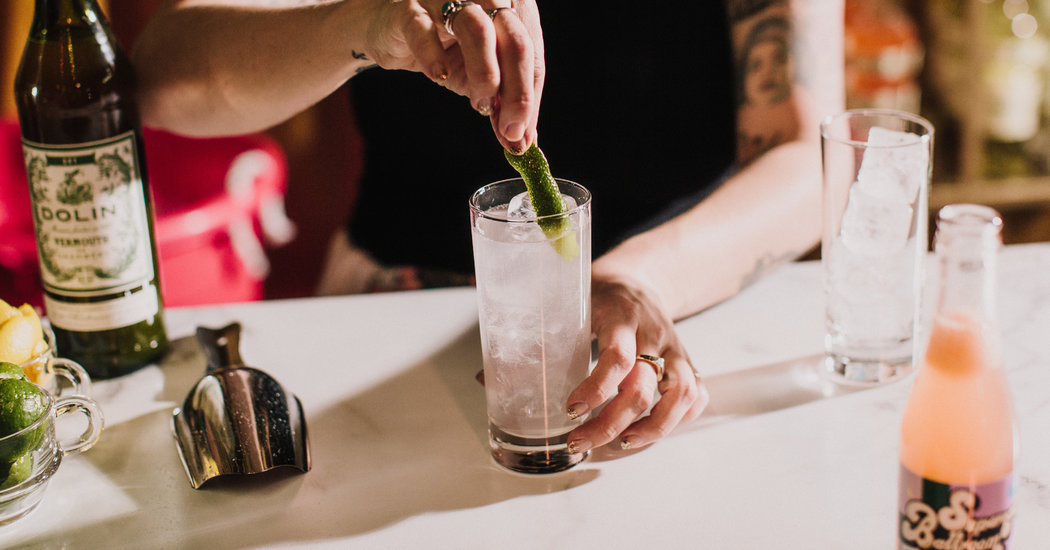
Iain Griffiths, 32, is constantly running in and out of bars, restaurants and bakeries, collecting food scraps and carrying leaking brown boxes.
As one half of the bartending duo Trash Tiki, he has to do collection rounds frequently. The food scraps are ingredients for Mr. Griffiths’ upcycled craft cocktail company, which he started with his wife and business partner, Kelsey Ramage. Together, they travel the world making drinks out of leftover items. Their aim: creating a more sustainable bar scene.
The couple started Trash Tiki in 2016, throwing parties in basements with the Sex Pistols blaring. It has since evolved into an international event series and online recipe platform that reimagines leftover items like watermelon rinds and fruit pulp.
These days, the founders are on a nationwide and European tour that has them reaching out to restaurants and other venues for kitchen hand-me-downs in whichever city they happen to be. They boil day-old croissants into sugar syrup, whip leftover milk from coffee shops into whey, and ferment discarded pineapple skins. Avocado pits are sautéed, chopped and strained for their nutty flavor. The husks of juiced-out limes, of which venues use hundreds in a night, are thrown into a pot for a “citrus stock.”
These ingredients find their way into reimagined favorites. A mai tai by Trash Tiki, for example, includes rum infused with discarded pistachio shells, and stock made of orange peels, boiled and blended almond croissants, lime husk citrus juice, and dried hibiscus. There’s some agave syrup in there too. Other drinks are more simple, such as a sweet and sour cocktail composed of strained apple pulp, sugar, water and citric acid.
Even the cardboard boxes are upcycled, into handmade coasters. As the couple says, single-use waste is just a lack of creativity.
“As soon as a waste item is created, you’re meant to create the second recipe,” said Ms. Ramage, 34. “Chefs have been doing it for centuries. It’s always been there. We’re just talking about it in a different way.”
The idea is to inject some fun into sustainability, which Mr. Griffiths said tends to be a dry and boring topic. He cited social media influencers posting photos of plastic-free groceries and “patting themselves on the back.”
“None of that resonated with us,” Mr. Griffiths said. “We’re bartenders. We’re used to the lights down, music up loud, and having really engaging atmospheres.”
In November, Trash Tiki served drinks to over 1,300 attendees at a party for Summit L.A., an ideas conference. As at all of their events, Mr. Griffiths and Ms. Ramage had less than 10 hours to source perishable ingredients from around downtown L.A. and make cocktails with whatever they got — a “Top Chef” challenge by way of Oscar the Grouch.
The rooftop bar Broken Shaker supplied the cilantro and mint. The herbs’ leaves had been picked the previous evening for garnishes, leaving just the bare but flavorful stems.
“These are great quality, really nice,” said a pleased Ms. Ramage. “Sometimes, they’re limp.” (She poached them in the whey.)
Four cups of stems fortified more than 400 punch drinks. Grapefruit peels, coffee grounds and cucumber pulp also all made their way onto the menu. Mr. Griffiths and Ms. Ramage collected more than they could use, and would send the rest to compost. Sometimes, Trash Tiki will freeze-dry leftovers or offer them to other recyclers, like one friend who uses coffee grounds for a skin scrub.
Mr. Griffiths and Ms. Ramage estimate that a single bar produces enough waste in one night to supply a two-night pop-up. They believe the average bar could save $550 a night simply by reusing 50 percent of its ingredients. On their website, the couple share tips on how to work with local establishments like coffee shops and hotels.
The couple also champion locally sourced, in-season ingredients. At their newly opened bar in Toronto, Supernova Ballroom, for example, bartenders forgo fresh lemon juice for liquid made by fermenting lemon rinds, which are donated from a nearby juice company. When refrigerated, it can last weeks.
“People can order a perfect daiquiri at a Stockholm bar all year round, but we’ve forgotten about all the steps it takes to get limes to Sweden in the dead of winter and what the cost on the planet actually is,” Mr. Griffiths said. “Convenience has become the ruler above else.”
For all the captivating advice, Trash Tiki still struggles with image perception — most notably, that it is dumpster-diving. “The hardest part of this is finding a way to talk about it that doesn’t sound gross,” Mr. Griffiths said.
A few Summit L.A. attendees showed hesitation and questioned the cleanliness of the cocktails. But the ingredients never go near a trash bin. Trash Tiki instructs partners to refrigerate leftover produce in clean containers, which are then vacuum-sealed for transfer. They wash and boil ingredients in a standard kitchen to meet health standards.
“I’m all for it,” said Carissa Estreller, 31, a marketing director who attended the conference. “It makes me appreciate the drink a little bit more.”
In the last two years, Trash Tiki has visited nearly 100 cities. At first, Mr. Griffiths said, “we got told that brands would never work with us.” Now, alcohol brands rush to support the cause. Fords Gin sponsored the North American leg of their tour, while Pernod Ricard appointed them global sustainability ambassadors and asked them to create training programs for 10,000 bartenders.
Of course, sustainability involves more than anti-waste initiatives, and extends far beyond the bar industry. But the hope of Trash Tiki is to help people more consciously examine their habits.
“It’s really important to let those ideas cross over into your daily life,” said Ms. Ramage, “even when you’re just shutting off and having a cocktail.”







